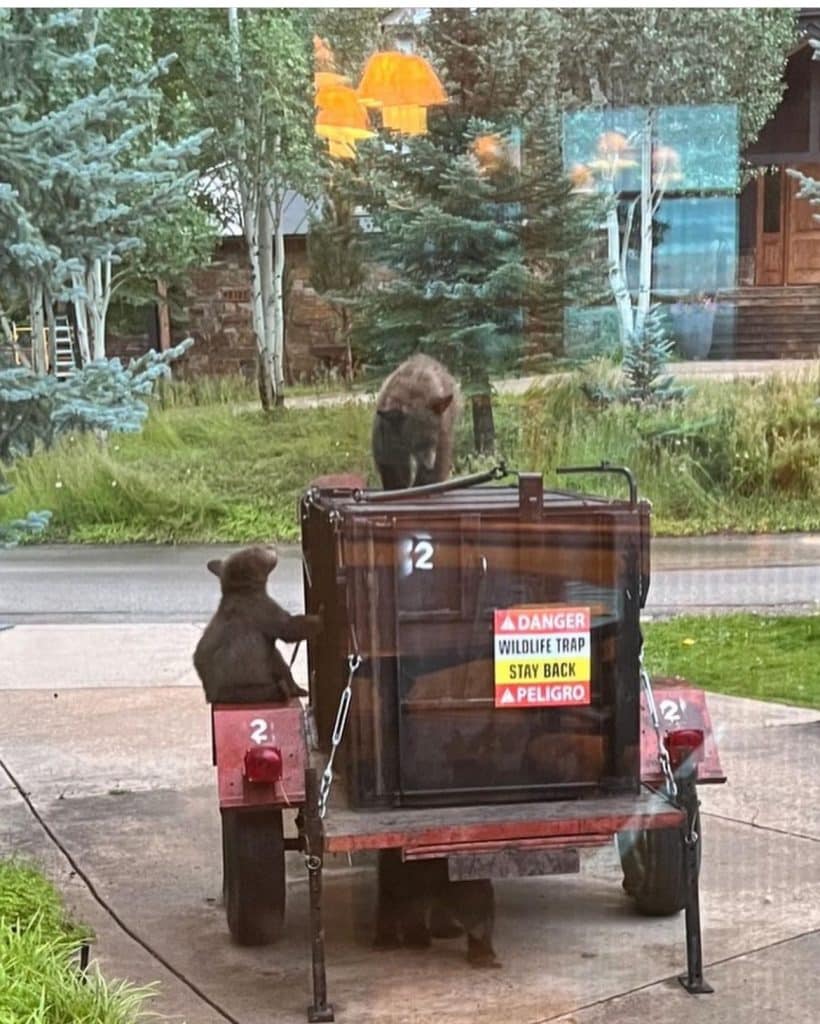Colorado Bear Coalition hosts ‘town hall’ to explain bear killings
"Priority for us — 100% of the time — goes to the people."

Courtesy photo
The Colorado Bear Coalition hosted an Aspen community meeting on Tuesday to discuss with a skeptical audience the euthanizing of a sow and her four cubs in August.
Colorado Parks and Wildlife officers were present to help residents understand why the five bears were euthanized and offer ways to prevent a similar situation in the future.
The meeting began with an explanation of what happened to the sow and her four cubs by CPW Area Manager Matt Yamashita. He described the process that led to the decision to euthanize the sow and four cubs.
Evidence — including tracks, hair and scat from both an adult bear and cubs — showed there were bears in the home. The reporting party only saw two cubs enter the home before locking themselves in a bedroom.
According to Yamashita, after the sow was trapped, it was reported the cubs were trying to gain entry to the house through the same window they had previously entered. He said that, because there was no way to distinguish between the cubs that may have entered the home and the cubs that may not have, all four had to be euthanized.
“Priority for us — 100% of the time — goes to the people. As a public agency, we can’t waiver on that; it always has to be our first priority,” he said.
One question repeated often by people in the audience was why the bears were euthanized and not relocated.
“We won’t relocate a bear that has been occupied a human home,” Yamashita said. “We don’t relocate bears that have posed a threat to human health and safety. By policy, dangerous bears are euthanized.”
CPW policy identifies three types of bears: nuisance bears, depredating bears and dangerous bears. Bears that enter a human home are considered to be dangerous bears that pose an immediate threat to human health and safety.
Relocating bears is no simple task and comes with its own set of risks. In order for CPW to relocate bears, it has to be within the state, and it must be a habitual space. According to Yamashita, it is difficult to find a place to relocate bears that is not near homes. Even if they had been relocated, there is a high chance the bears would try to come back and get killed while doing so.
Additionally, bear cubs do not typically unlearn behavior, and this was taken into consideration when the decision to not relocate the cubs was made.
“What (bear cubs) are learning that first year will imprint on them and will be learned behaviors for the rest of their lives,” Yamashita said. “You can’t untrain them from going into a house.”
According to CPW, 17 bears have been euthanized this year out of 402 calls in the region, including Pitkin and parts of Garfield and Eagle counties.
When homeowners call about a bear inside a home, they are immediately informed that the bear will be trapped and euthanized. Homeowners have the option to refuse CPW setting a trap on their property.
Community members felt strongly that more could be done by individuals to prevent instances like this from occurring in the future. Many suggested holding those who do not practice responsible bear safety more accountable through larger fines for improper trash removal. Others suggested that tourists and those whose second home is in Aspen be given more resources, so they know to better secure ground level windows and doors.
Bear management
There are many other ways for community members to deter bears without getting CPW involved.
“One quick example is we have planted buffer zones in open spaces in Boulder,” said Brenda Lee, founder and president of Colorado Bear Coalition.
Lee encouraged community members to work together to educate others about bears and how to exist with them.
The Colorado Bear Coalition’s mission “is to create a network of communities across Colorado to preserve the welfare of both bears and people” their website states.
Lee started Boulder Bear Coalition about a decade ago. Since then, she has been working with people across the state on human-bear conflict issues.
To reach Audrey Ryan, email her at aryan@swiftcom.com.
Preps: Persson leads AHS girls golf to another regional title; state track gets underway
The Aspen High School girls golf team is regional champion yet again after winning Tuesday’s state qualifying tournament at Cattails Golf Club in Alamosa.









